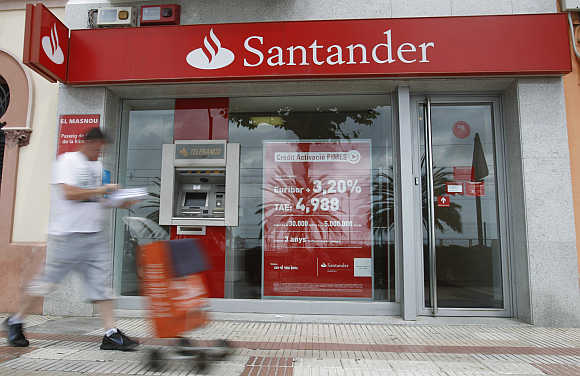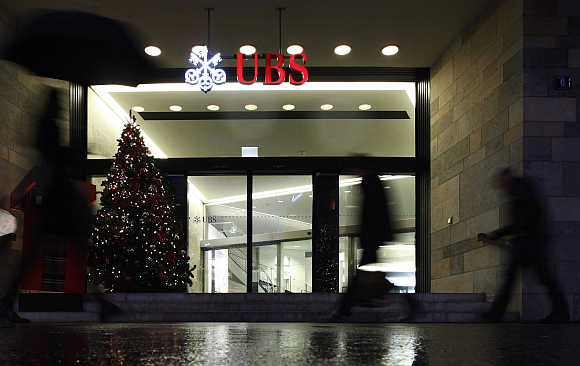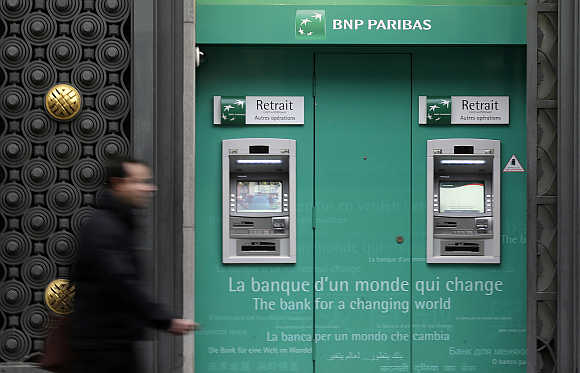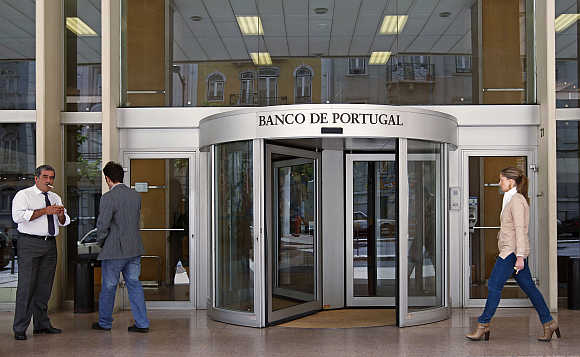
With non-performing loans rising, European banks may be forced to reduce their India exposure, putting more pressure on the rupee.
The continent with the biggest debt burden is unlikely to be up on its feet any time soon. Rather, it’s treading a path that can be disastrous at best. A path down which a “can” can be kicked, but it eventually juts out to the sea. And, unfortunately, little space is left before it finally does.
Are you wondering what I am referring to? It’s the big elephant in the room - the European banking sector. The fact is that there are too many banks in Europe, and they are all too dominant. One indicator, total banking assets to gross domestic product ratio, shows it all.
...

However, the quality of the banking sector is under severe stress, thanks to non-performing loans recording a sharp rise since the crisis began. To better explain the situation, let’s consider the immediate pre-crisis periods - 2007 and 2011. The countries for which data are available for 2012, the situation has mostly worsened.
A JP Morgan report in May on global asset allocation paints a grim picture of rising NPLs in Europe. According to the report, Europe is sitting on an NPL time bomb - what with NPLs rising exponentially in the euro area peripheral countries and already surpassing the euro 500-billion mark. Even in the core countries, NPLs are rising, with the sole exception of Germany.
...

The problem is that bad debts and NPLs reduce the capacity of banks to lend, hindering the monetary policy transmission mechanism, which, in any case, seems to have been broken.
As a Bank of America Merrill Lynch study showed, there has been a drastic fall in private sector credit growth in a large number of European economies, especially in countries like Spain and Ireland, where there is a noticeable de-growth.
In countries like France and Germany, it is hardly (if at all) increasing. Overall, the credit situation in the euro area looks quite bleak given bank loans to the private sector seem to be on a perpetual decline.
...

While the private sector credit plummets at an alarming rate, banks are using the billions of euros thrown at them by the European Central Bank - not by lending to the private sector (which is perceived “risky”), but using the cheap money to buy sovereign debt of countries on the precipice, such as Spain and Greece.
According to the available information, the Greek government’s 10-year bond yields have been falling sharply, indicating a virtual lack of respect for risk. In fact, within one year, the yield on the 10-year Greek bonds dropped from 29 per cent in May 2012 to eight per cent in May this year.
...

European banks seem to be intent on playing the arbitrage game of borrowing cheap from the ECB and locking in the same fund on the ECB-guaranteed sovereign bonds, while the real economy is starved off funds.
Banks, thus, face a dual challenge of experiencing further impairment of assets as unemployment remains at historically high levels, and still rising in many countries, while the economies are barely moving. Rather, these are contracting.
In fact, as of 2012, the economies are now below where they were in 2008 in nominal terms. NPLs are understated since the sovereign bonds, being guaranteed by the ECB, are not assigned any risk weightage.
...

However, while all the guarantees and bailouts have reduced the tail risks of a euro zone break-up, the dangers have, by no means, receded. While the troika (the ECB, the European Union and the International Monetary Fund) would prefer to ring-fence bigger economies such as Spain and Italy from imploding, there is no guarantee that the smaller ones would continue to enjoy the privilege that they are enjoying now, by default.
What happened in Cyprus is unlikely to be an exception. Even the Spanish government has not been successful in selling all its banks since investors refused to accept official valuation and demanded increased guarantee against future losses.
...

Not surprisingly, it now fully owns three banks, controls another, Banco Mare Nostrum, and could yet end up controlling a fifth, Banco CEISS, if its sale to Unicaja falls through. In fact, last October, rating agency Moody’s had forecast that Spanish banks had a euro 100-billion capital gap, rather than the euro 54 billion projected during the stress test that was conducted.
And this gap would need funding. Hence, there would either be sovereign defaults and, hence, NPLs would rise, or these economies would lose market access once more. Ideally, the first option is better since weaker economies default and exit the common currency.
...

This would allow them to address the more fundamental problem of lost competitiveness, external deficits and recession. However, following the second path is akin to kicking the “can” down the road, which can make things even messier.
But whatever path is taken, NPLs will rise as economies continue to contract. If bailout fatigue sets in, banks would be forced to sell their assets to shore up their capital adequacy.
Where would that leave India? European banks might be forced to reduce their India exposure. This will increase the vulnerability of the already weak rupee.
The author is a Delhi-based independent economist. Email: https://kunalsthoughts.weebly.com